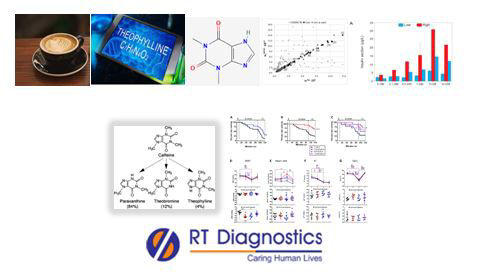Theophylline Test:
Why Theophylline Test?
CLINICAL INFORMATION
Phosphodiesterase (PDE), is an enzyme that cleaves the phospho-diester bond in the second messenger molecules cAMP and cGMP, that involved in signal transduction. Certain medications inhibit phosphodiesterase enzyme activity. 1,3 –dimethylxanthineia also called “theophylline”. As a member of the xanthine family, it has structural similarities to that of caffeine, theobromine etc. Theophylline is a phosphodiesterase inhibiting drug and moreover, it blocks the action of adenosine (an inhibitory neurotransmitter that induces sleep, contracts smooth muscles and relaxes the cardiac muscles) thus it is used to treat respiratory pathologies (especially in chronic obstructive pulmonary disease - COPD) as a bronchodilator. Theophyllines are medications that belong to a class of drugs called xanthines. The main actions of theophylline include relaxing bronchial smooth muscle, acting as a positive ionotrope (i.e increasing heart muscle contractility and efficiency), increasing heart rate, increasing blood pressure, increases renal blood flow, anti-inflammatory effect, CNS Stimulant (has a main effect on medullary respiratory centre) etc. Theophyllines are used to treat lung diseases such as asthma and COPD (bronchitis, emphysema etc). Treatment with theophyllines is used to prevent and treat certain clinical manifestations such as wheezing, shortness of breath, chest tightness etc caused by lung pathologies (mainly COPD) such as asthma, bronchitis, and emphysema, infant apnea (in preterm infants) etc. Accidental higher doses of theophylline can induce toxicity (complications such as seizures), hence need beta-blockers as an antidote. High theophylline levels in the blood can lead to vomiting, nausea, diarrhoea, muscle aches, tremors, anxiety, restlessness, increased heart rate, abnormal heart rhythms, CNS excitation (headache, insomnia, irritability, dizziness, high blood sugar, low BP, low potassium levels, lightheadedness etc. Theophylline can cause interactions with drugs such as erythromycin, cimetidine, SSRI, fluoroquinolones like ciprofloxacin etc. A Theophylline test is performed to monitor the amount of Theophylline levels present in the blood to evaluate toxicity and during prognosis (to maintain its narrow therapeutic window). Test results of theophylline can be affected by OCPs, antibiotics, anxiety medications, medications used to treat GERD etc. Additional studies include UV-visible spectroscopy studies etc. Other tests include electrolytes, blood gas, LFT etc.

General Instructions:
Sample Requirement: Specimen - Blood sample collected from the vein. Test Preparation: None.
NOTE - Sample for specimen collections may vary based on the patient’s condition/cases according to the patient’s presenting complaints/signs or symptoms:
SPECIMEN REQUIREMENT (Special or Rare Cases) - As instructed and guided by Physician / Clinician / Pathologist / as per Laboratory’s requirements, according to procedures and protocols.
This Multi-Specialty Clinical Referral Laboratory RT DIAGNOSTICS provides precise and accurate tests with an extensive range of testing services to the medical centres to help in the diagnosis and identification of pathology in the test specimens for infectious diseases and also to evaluate the function of organ systems of the patient. It prevents further complications and helps to stabilize and restore health to near normalcy at the earliest without delay.



